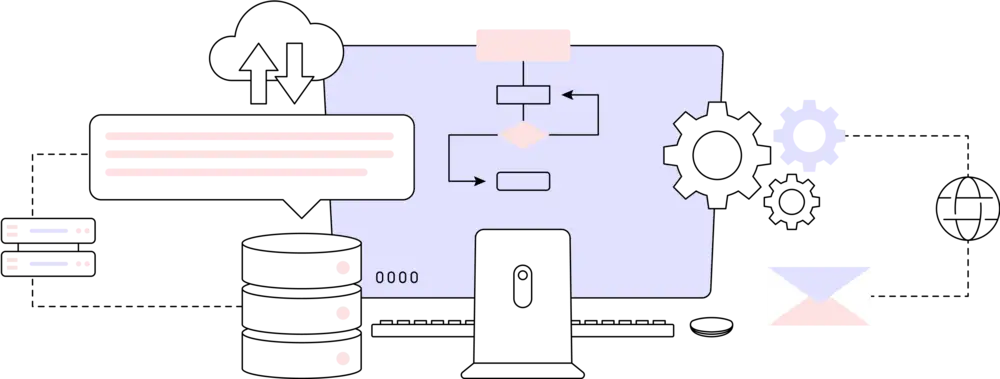Top System Design Courses
System design is crucial for excelling in software engineering interviews with leading tech companies. Explore our top-rated courses, created by industry experts, to master this challenging subject. Access these invaluable resources to enhance your preparation effectively.

The best system design courses for beginners and experienced developers
Discover the apex of system design learning with our expertly crafted courses, designed for beginners and seasoned professionals. Industry veterans lead each course and provide comprehensive coverage from basic principles to advanced concepts like scalability and resilience. You'll get a clear idea of how to learn system design.
Enjoy interactive learning with real-world examples, step-by-step problem-solving guides, and rich, illustrative diagrams. Benefit from additional resources such as cheat sheets, templates, and mock interviews to fully prepare you for top tech interviews. Take our system design course online for a structured, practical approach to mastering system design effectively and affordably. Join us to elevate your career in software engineering.
Courses
Grokking the Modern System Design Interview
The ultimate guide to the System Design Interview – developed by Meta & Google engineers. Master distributed system fundamentals, and practice with real-world interview questions & mock interviews.
Intermediate
26h
Courses
Grokking the Principles and Practices of Advanced System Design
Ready to become a System Design pro? Unlock the world’s largest distributed systems, including file systems & databases from hyperscalers like Google & Amazon.
Advanced
20h
Courses
The System Design Interview Prep Handbook
The ultimate guide to the System Design Interview – developed by Meta & Google engineers. Master distributed system fundamentals, and practice with real-world interview questions & mock interviews.
Intermediate
26h

Why you should learn system design
System design guides software engineers to preemptively address issues that could impact system performance. This is why system design is important. It involves understanding the architecture and components of a system to resolve potential problems efficiently, enhancing overall functionality. Beginners and mid-level engineers are encouraged to learn system design early to gain a competitive edge.
Following system requirements analysis, system design allocates functions to hardware and software components. As an essential skill in software engineering, knowledge of system design is vital. A system design certification will provide a foundation for beginners to understand and implement these principles effectively.
Learn system design fundamentals with beginner courses
Knowing what system design is will help you with efficient software creation. Our beginner courses teach essential concepts such as design patterns, fault tolerance, and API design. Start building strong, scalable software systems with confidence and precision. When you’re ready, explore the more advanced courses to master system design and design patterns.
Prepare for your system design interview
Start your journey through system design concepts with our courses, designed to ensure success in technical interviews and beyond.
- Learn to construct complex systems with modular, scalable system design strategies and the RESHADED framework.
- Study the Uber design system for building web-scale applications through detailed, real-world problem-solving.
- Our Grokking the System Design Interview course equips you with the tools to design for scalability, tackle intricate project requirements, and excel in any system design interview. Start with fundamental building blocks, then advance to designing popular services efficiently.
What do system designers do?
System designers produce comprehensive design documents to guide the development of computer systems in alignment with business requirements. Here's a list of careers you can pursue after studying system design:
- Web designer
- UX designer
- Game designer
- Software engineer
- Cyber security analyst
- Application analyst
- Information systems manager
- Systems analyst
- Networking engineer
Frequently Asked Questions (FAQs)
Does system design require coding?
In contrast to coding interviews, system design interviews usually do not involve writing actual code. Instead, you can be asked to write pseudocode or create diagrams to illustrate your architectural plan.
How do I start system design?
- Understand the requirements: Clarify what is needed before starting the design process.
- Define the system architecture: Establish the overall structure of the system.
- Choose the technology stack: Select appropriate technologies for development.
- Design the modules: Outline and organize the different components of the system.
- Plan for scalability: Ensure the system can handle growth in users and data.
- Consider security and privacy: Integrate measures to protect data and maintain privacy.
- Test and validate: Conduct thorough testing to ensure the system meets design specifications.
What is a system design course?
System design involves establishing a protocol for defining software and hardware architecture. A system design course covers operational requirements for the system’s components, modules, interfaces, and data. System design is typically divided into physical and logical design.
How long does it take to learn system design?
You can learn system design with 1–3 months of regular study and practice, focusing on understanding various system architectures and solving complex design problems.

